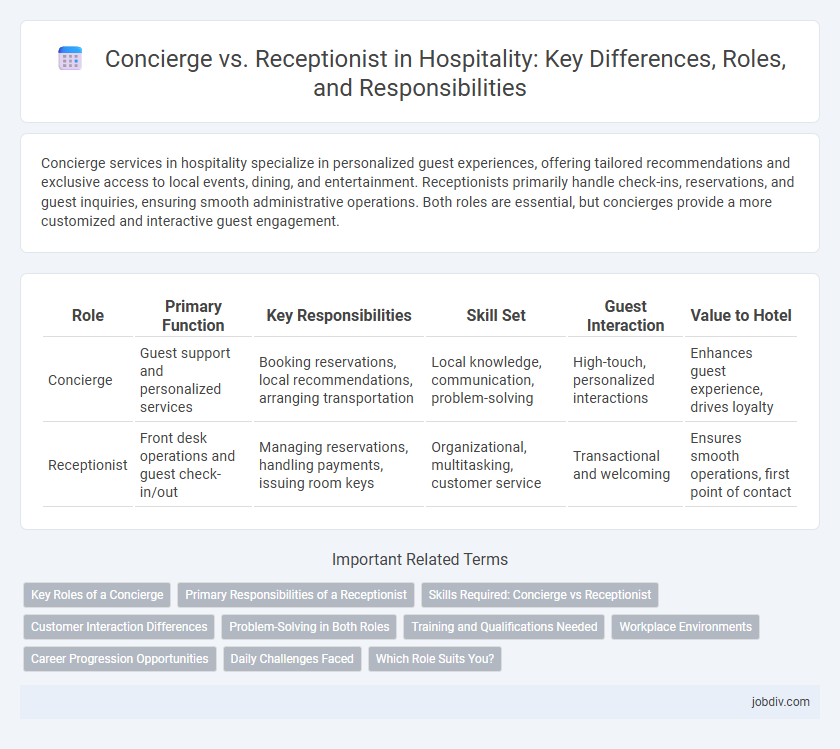Concierge services in hospitality specialize in personalized guest experiences, offering tailored recommendations and exclusive access to local events, dining, and entertainment. Receptionists primarily handle check-ins, reservations, and guest inquiries, ensuring smooth administrative operations. Both roles are essential, but concierges provide a more customized and interactive guest engagement.
Table of Comparison
| Role | Primary Function | Key Responsibilities | Skill Set | Guest Interaction | Value to Hotel |
|---|---|---|---|---|---|
| Concierge | Guest support and personalized services | Booking reservations, local recommendations, arranging transportation | Local knowledge, communication, problem-solving | High-touch, personalized interactions | Enhances guest experience, drives loyalty |
| Receptionist | Front desk operations and guest check-in/out | Managing reservations, handling payments, issuing room keys | Organizational, multitasking, customer service | Transactional and welcoming | Ensures smooth operations, first point of contact |
Key Roles of a Concierge
Concierges in hospitality specialize in personalized guest services, including arranging transportation, booking reservations, and providing local recommendations, enhancing the overall guest experience. Unlike receptionists who primarily handle check-ins, check-outs, and front desk inquiries, concierges offer tailored assistance, ensuring each guest's unique needs are met. Their deep knowledge of local attractions and exclusive services makes concierges essential for delivering luxury and convenience in hotels.
Primary Responsibilities of a Receptionist
A receptionist in hospitality serves as the first point of contact, managing guest check-ins and check-outs with efficiency and professionalism. They handle reservations, answer inquiries, and coordinate with other hotel departments to ensure seamless guest experiences. Receptionists also maintain accurate records, process payments, and provide essential information about hotel services and local attractions.
Skills Required: Concierge vs Receptionist
Concierges require advanced interpersonal skills, extensive local knowledge, and the ability to personalize guest experiences through tailored recommendations and problem-solving. Receptionists need strong organizational abilities, proficiency with booking systems, and excellent communication skills to efficiently manage check-ins, reservations, and guest inquiries. Both roles demand a customer-focused attitude and multitasking capabilities, but concierges emphasize personalized service while receptionists focus on operational efficiency.
Customer Interaction Differences
Concierges in hospitality provide personalized service by anticipating guest needs, offering tailored recommendations, and arranging special requests, enhancing the overall guest experience. Receptionists primarily manage front desk operations including check-ins, check-outs, and answering general inquiries, serving as the guest's first point of contact. While both roles require strong communication skills, concierges engage more in proactive, customized interactions, whereas receptionists focus on efficient, transactional communication.
Problem-Solving in Both Roles
Concierges excel in problem-solving by offering personalized solutions and local expertise to enhance guest experiences, often handling complex requests such as arranging special activities or resolving itinerary issues. Receptionists focus on efficiently managing check-ins, check-outs, and general guest inquiries, swiftly addressing operational problems to ensure smooth front desk functionality. Both roles require strong communication and crisis management skills, but concierges tend to address more specialized, guest-centric challenges while receptionists prioritize immediate administrative resolutions.
Training and Qualifications Needed
Concierge roles in hospitality typically require specialized training in local knowledge, customer service, and problem-solving skills, often supported by certifications like Certified Guest Service Professional (CGSP). Receptionists need strong interpersonal abilities and basic administrative training, with proficiency in reservation software and front desk operations commonly emphasized. Advanced qualifications and ongoing professional development distinguish concierges by enabling personalized guest experiences beyond routine check-in tasks.
Workplace Environments
Concierges typically operate within luxury hotels, resorts, or exclusive residential buildings, offering personalized services such as booking reservations, arranging transportation, and providing local recommendations, which require extensive local knowledge and strong interpersonal skills. Receptionists are more common in a wide range of workplaces, including budget hotels, corporate offices, and medical facilities, focusing on administrative duties like checking guests in and out, answering phones, and managing appointments. Both roles demand professionalism and communication skills, but concierges work in environments that prioritize guest experience and tailored service, while receptionists maintain front-desk operations centered on efficiency and administrative support.
Career Progression Opportunities
Concierge roles often offer specialized career progression opportunities within luxury hospitality, including positions such as guest experience manager or lifestyle consultant, emphasizing personalized service and unique guest requests. Receptionist positions provide foundational experience in front-desk operations and customer service, serving as a stepping stone to supervisory roles or administrative management within hotel operations. Both career paths can evolve with continued training and experience, but concierge roles typically demand advanced knowledge and skills that lead to higher-level guest relations positions.
Daily Challenges Faced
Concierge staff in hospitality navigate complex guest requests, local service coordination, and personalized experience delivery, demanding extensive local knowledge and multitasking abilities. Receptionists confront high volumes of check-ins, reservation management, and resolving booking discrepancies swiftly, requiring proficient organizational skills and calm under pressure. Both roles face the continuous challenge of maintaining exceptional communication while adapting to rapidly changing guest needs and operational demands.
Which Role Suits You?
A concierge excels in personalized guest services, offering tailored recommendations and exclusive experiences, ideal for individuals who enjoy problem-solving and building strong guest relationships. Receptionists manage front desk operations, handling check-ins, reservations, and administrative tasks, fitting those who prefer structured, multitasking environments. Assess your strengths in customer interaction and organizational skills to determine which hospitality role aligns best with your career goals.
Concierge vs Receptionist Infographic

 jobdiv.com
jobdiv.com